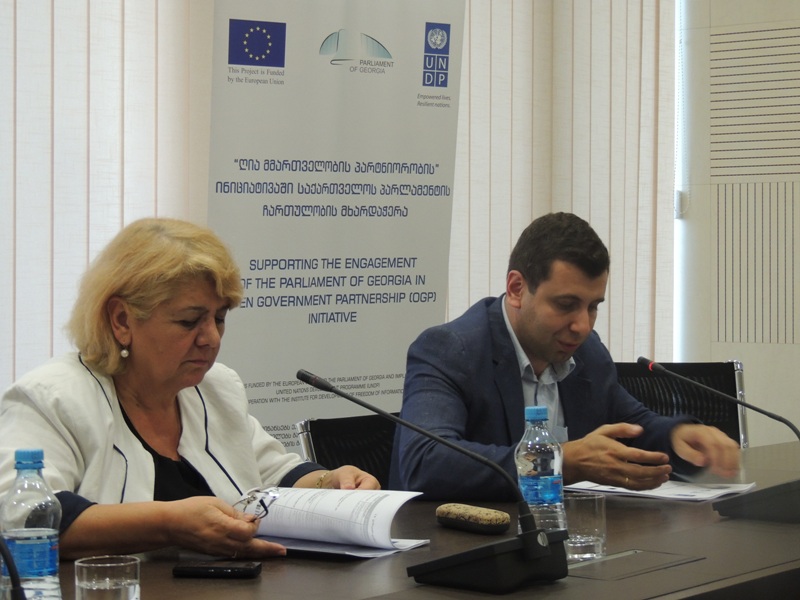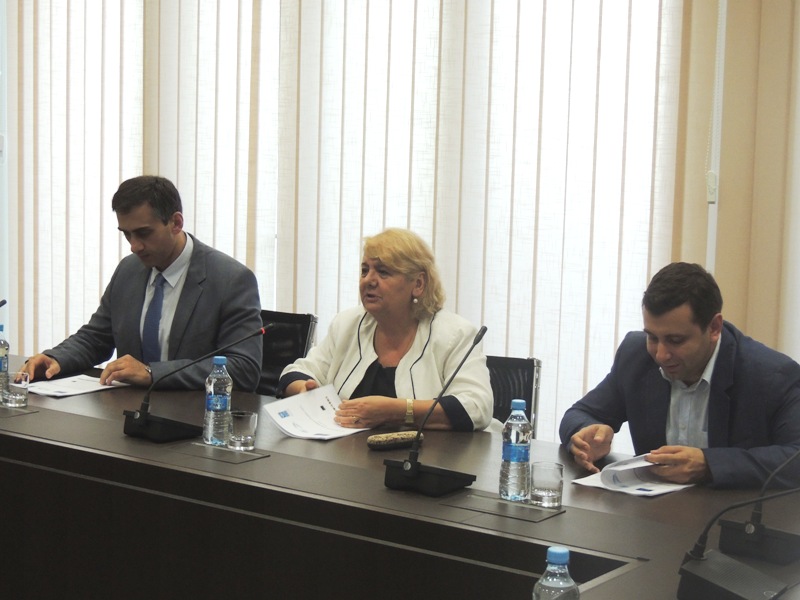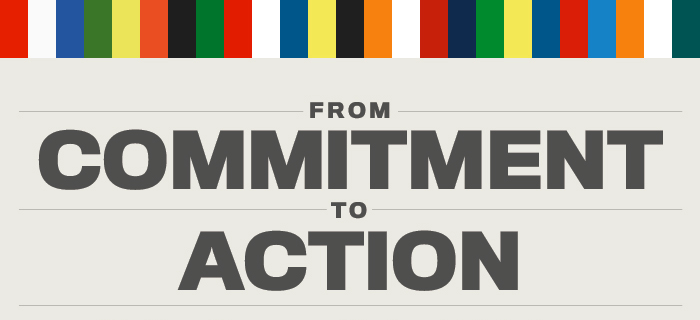


On July the 10th, 2015, Inter-Factional Group of the Parliament of Georgia adopted the Open Parliament Georgia Action Plan. The main purpose of the Action Plan is to ensure the openness of the Parliament in accordance to the principles of Open Governance Partnership (OGP) and Declaration on Parliamentary Openness, transparency of the information provided by the Parliament and to support the increase of citizen’s engagement in parliamentary activities and in the legislative process.

Intensive work on the Open Parliament Georgia Action Plan has lasted almost for half a year. At the same time, it is worth mentioning that the non-governmental organizations advocated the commitments to the Parliamentary Openness but these recommendations were not taken into consideration while the National Action Plan for the years of 2014-2015 was elaborated.
Parliament of Georgia was presented in elaboration of Open Parliament Georgia Action Plan, with the Inter-Factional Group and International and Non-Governmental Organizations participated in the process of elaboration with the Open Parliament Georgia Working Group. The Institute for Development of Freedom of Information (IDFI) was a coordinator of the working process on the Open Parliament Georgia Action Plan that was conducted by the Inter-Factional Group and by the Open Parliament Georgia Working Group.
The Inter-Factional Group was established by the, February 12, 2015, order of the Chair of the Parliament of Georgia . Decree of the Chair of the Parliament of Georgia defined that the purpose of the Inter-Factional Group is to elaborate Open Parliament Georgia Action Plan and to support the participation of the Parliament of Georgia in “Open Government Partnership” (OGP) initiative.
The following International and Non-Governmental Organizations participated in the Open Parliament Georgia Working Group: European Union (EU), United Nations Development Programme (UNDP), Institute for Development of Freedom of Information (IDFI), USAID, Transparency International Georgia, Georgian Young Lawyers’ Association, NDI, Open Society Georgia Foundation, Civil Society Institute, GIZ, Eastern Partnership Civil Society Platform, CiDA, JumpStart Georgia, Council of Europe and Economic Policy Research Center.
The activities of the Inter-Factional Group and the Open Parliament Georgia Working Group are supported by the project – “Supporting Parliament of Georgia Involvement in Open Government Partnership”. The project is implemented by the Institute for Development of Freedom of Information (IDFI) in partnership with the Parliament of Georgia within the joint project of the European Union (EU) and the United Nations Development Program (UNDP) “Strengthening the System of Parliamentary Democracy in Georgia”.
With the support of the IDFI’s project and in order to improve the partnership of the Inter-Factional Group and the Open Parliament Georgia Working Group, Memorandum was signed between the Parliament of Georgia and International and Non-Governmental Organizations, on April 30th, that designates the cooperation of the Inter-Factional Group with the International and Non-Governmental Organizations regarding the elaboration of the Open Parliament Georgia Working Plan. The Memorandum also envisages that International and Non-Governmental Organizations express their readiness to assist Inter-Factional Group in frameworks of OGP and elaboration of Open Parliament Georgia Action Plan.

For more efficiency of the Inter-Factional Group, members created the Editorial Group comprising of several MPs of the Inter-Factional Group who were most actively involved in the process of consultation with the International and Non-Governmental Organizations.
With the support and arrangement of IDFI, which is the secretary of the Open Parliament Georgia Working Group, 5 meetings were held among the Inter-Factional Group and the Open Parliament Georgia Working Group since March 5, 2015. Meetings were also held among the International and Non-Governmental Organizations which aimed at working out the unified position of Civil Society regarding the action plan. During these meetings the recommendations for the Open Parliament Georgia Action Plan were drawn out. Recommendations were presented by the International and Non-Governmental Organizations participating in the Open Parliament Georgia Working Group.
One of the most important was the field meeting in Kazbegi, on May 23, where the final commitments were agreed among the Parliament and the Civil Society sector after almost 11 hours of discussion. The representatives of the Staff of the Parliament of Georgia also took an active part in the elaboration of the Open Parliament Georgia Action Plan, particularly, Secretary General of the Parliament of Georgia, Deputy Secretary General and Head of the Legal Department of the Parliament of Georgia, Head of the Informational Technologies Department of the Parliament of Georgia, and Head of the Public Relations and Information Department of the Parliament of Georgia. At the same time, Head of Cabinet of Chair of the Parliament of Georgia was also involved in the process of elaboration of the Open Parliament Georgia Action Plan.
Furthermore, the Institute for Development of Freedom of Information (IDFI) also conducted the research – Issues of Parliamentary Openness in Open Government Partnership (OGP) Member Countries. Research proved to be an essential asset to the process of elaboration of the Open Parliament Georgia Action Plan because on the one hand the commitments on Parliamentary Openness of OGP members countries’ were analyzed and on the other hand the recommendatory commitments of the Open Government Guide were studied. Therefore, the Georgian Commitments on the Parliamentary Openness are drawn out on the best international experience.
The Chair of the Parliament of Georgia also participated in one of the final joint meetings of the Inter-Factional Group and the Open Parliament Georgia Working Group and stated the following regarding the action plan:
“I think it is very ambitious action plan and when I read it for the first time, I thought to reduce the rate or size, to make it more realistic but then I thought – if we do this, the task of the valuable membership of the European Family should be postponed by decades as well. If we do not do the strenuous work, including meeting with the tight deadlines and large volumes of the performance conditions, we just will not be able to achieve the goals we have aimed. Thus, I concluded that it is better to put ourselves in the tough situation and work more in the short period of time, rather than to think of reducing something. So, I join the present case volume. There is a doubt of implementation of all the commitments, but we have about a year and half for doing this.“ Davit Usupashvili mentioned that involvement of various Departments was very important in the implementation process of the action plan. “They should be able to make the action plan as their priority and the political members of the Parliament should make a great contribution in this way, but it does not have to dependent on our political attitudes. We are talking about the Parliamentary Instruments and Mechanisms that have to continue work in the future as well“, said Davit Usupashvili.

The Open Parliament Georgia Action Plan consists of 18 commitments that are in accordance to the OGP principles of Public Involvement, Access to Information, Technologies and Innovation and Accountability:
1. Public Involvement
1.1. The Possibility of Commenting the Draft Bills (electronically and/or in a written format);
1.2. Presenting the Legislative Proposals and Legislative Initiatives to the Parliament of Georgia via Electronic Way and Implementing Its Supporting Mechanism through the Official Web-Page of the Parliament of Georgia;
1.3. Enabling the Civic Engagement in the Legislative Process (regarding the proposed amendments to the constitution);
1.4. Providing the Easy Attendance to the citizens on the Plenary Sessions and Committee Meetings;
1.5. Underlining the Obligation to Present the Substantiations for the Anticipated Amendment of the Agenda of the Committee Hearing;
1.6. Raising the educational and awareness level about the activities, role and mission of the Parliament of Georgia; strengthening the institutional image and the role of the Parliament of Georgia;
2. Access to Information
2.1. Easing Access for the People with Disabilities to the Parliamentary Documents;
2.2. Proactive Publishing of the Annual Reports and Conclusions of the Committees of the Parliament of Georgia;
2.3. Enacting the Legislative Frame of Consultations during the Legislative Process;
2.4. On time Publishing of the Amendments to the Initial Draft Bill, altered during its Discussion, on the Web-Page of the Parliament of Georgia;
2.5. Renewing the list of the proactively published public information;
2.6. Updating the Internal Part of the Explanatory Cards of the Draft Bills;
3. Technologies and Innovation
3.1. Placing the Documents on the Web-Page of the Parliament of Georgia in a Raw Format;
3.2. Implementation of the new technologies and innovative approaches; increasing the level of involvement of youth, ethnical minorities and other stakeholders in the activities of the Parliament of Georgia; strengthening the bilateral communication with the society;
4. Accountability
4.1. Creating the Permanent Parliamentary Council on Openness and Transparency;
4.2. Enabling the Obligation to Hold the Annual Meeting of the Parliament of Georgia with the Civil Society Organizations;
4.3. Developing and Adopting the State Concept regarding the Development of Civil Society Organizations;
4.4. Elaborating the Ethical Code for the Members of the Parliament of Georgia.
It should be noted that among these commitments 16 of them were elaborated according to the recommendations of the civil society organizations and the two commitments were initiated by the Staff of the Parliament of Georgia.
8 MPs participated in the Inter-Factional Group Meeting, which adopted the Open Parliament Georgia Action Plan, on July 10, 2015.
Only small number of OGP member states have obtained the action plan on the Parliamentary Openness. By approving this plan, Georgia moved forward to become one of the leader countries of Parliamentary Openness with the OGP.
After the adoption, the Action Plan was sent to the Bureau of the Parliament of Georgia for the further approval.